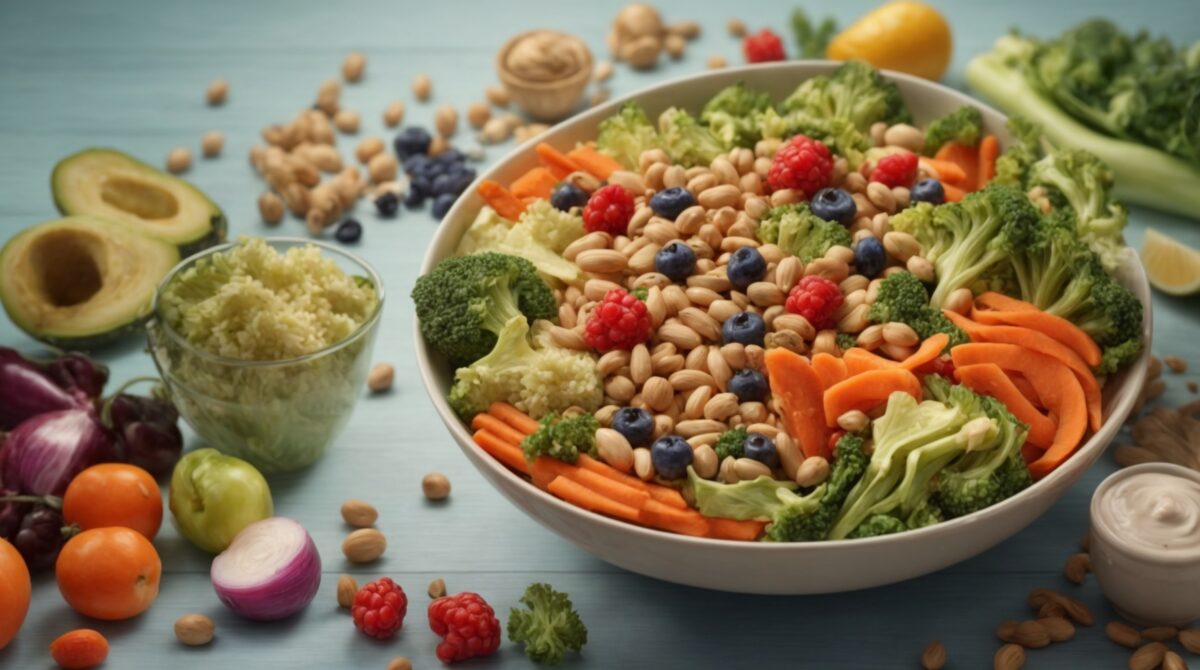Switching up your diet can often feel overwhelming. But what if you didn’t have to give up all the foods you love? Enter the flexitarian diet. This eating lifestyle offers the best of both worlds—mainly plant-based meals while still allowing meat and animal products occasionally. The term “flexitarian” is a blend of “flexible” and “vegetarian.” Let’s dive into the health benefits of the flexitarian diet and why it might be the perfect fit for you.
What Is the Flexitarian Diet?
Understanding the flexitarian diet starts with its two core principles: flexibility and plant-based meals. Unlike strictly vegetarian or vegan diets, flexitarian eaters get to enjoy a flexible approach to their food choices. It’s like dipping your toes into a plant-based lifestyle without jumping in completely. You can enjoy the health benefits of a plant-based diet, with the freedom to eat meat when you like.
I’ve personally found that adopting a flexitarian diet made my transition to healthy eating smoother. I grew up in a meat-centric culture, but I’ve always wanted to eat more plants for better health. Going full vegetarian felt daunting, but the flexitarian lifestyle provided just the balance I needed.
Why Consider a Flexitarian Diet?
First, it’s sustainable. Let’s face it—giving up meat entirely isn’t for everyone. But reducing your meat intake? That’s doable. A 2016 study in the journal Public Health Nutrition found that people often stick to diets that let them enjoy their favorite foods occasionally. The flexitarian diet does exactly that. It lets you minimize meat and maximize plants without feeling deprived.
Health Benefits of the Flexitarian Diet

So, what’s in it for you? A ton of health perks, that’s what. Let’s break down the main health benefits of the flexitarian diet.
Weight Loss and Management
Are you struggling with weight loss? The rather rigid and restrictive nature of most diets may deter you. The flexitarian diet can help you shed those extra pounds without drastic changes. A 2015 study showed that semi-vegetarians had lower body mass indexes (BMIs) compared to omnivores. Substituting high-calorie, meat-heavy meals with plant-based options can cut down your caloric intake.
When I tentatively started this diet, I noticed a drop in my weight without feeling starved or restricted. I could enjoy hearty salads, whole grains, and yes, even a steak from time to time. The balance prevents me from having those dreaded diet binges—where you overeat due to restriction fatigue.
Better Heart Health
Flexitarian diets can boost your heart health big time. By cutting back on saturated fats from meat and dairy, you lower your cholesterol levels. A 2019 report by Harvard Health Publishing emphasized the benefits of plant-based diets in reducing heart disease risks. Plants are rich in soluble fibers that help maintain healthy cholesterol levels and blood pressure.
My own experiences align with these findings. Incorporating more beans, lentils, and veggies into my meals improved my cholesterol levels during my last health check-up. I didn’t even notice the changes day-to-day, which goes to show how seamless and effective the diet can be.
Improved Digestion
Got tummy troubles? Then you’ll love this. The fiber in plant-based foods is a godsend for your gut. Foods rich in fiber, like beans, lentils, fruits, vegetables, and whole grains, can regulate your digestive system. They help prevent constipation and balance gut bacteria.
Since embracing the flexitarian lifestyle, I’ve experienced fewer digestive issues. My meals are varied and rich in different fibers that keep my digestive system humming smoothly. I can honestly say the diet has significantly improved my gut health.
Diabetes Prevention and Management
Here’s some sweet news—incorporating a flexitarian diet might help manage diabetes or even prevent it. Consuming more plants and fewer animals leads to better insulin sensitivity. Research in Harvard Health indicates that diets high in plant foods can help to regulate blood sugar levels effectively.
For those who have blood sugar levels within borderline ranges like me, introducing more whole foods and fewer processed items has been a game-changer. Even my cheat days, where I savored a moderate meat meal, didn’t spike my levels as much. It’s easier to keep balanced when you have a foundation rooted mostly in plants.
Nutrition and Variety
Flexitarian diets don’t cut out entire food groups. So, you get a wider range of nutrients. For example, protein from eggs and fish combined with vitamins and minerals from vegetables and grains makes for a well-rounded diet.
During my diet revamp, I discovered new foods I hadn’t typically eaten before, like quinoa and chickpeas. These foods not only nourish my body but also add flavors and textures to my meals. My diet is now a vibrant mix, keeping my taste buds and my body well-satisfied.
Reduced Risk of Cancer
You might not know this, but diets rich in fruits and vegetables are linked to lower cancer risk. According to the National Cancer Institute, plant-based diets contain nutrients that help in cancer prevention, such as antioxidants and vitamins.
Eating less red and processed meat and more plant-based foods lowered my own concerns about such risk factors. Every meal rich in fresh veggies, fruits, legumes, and nuts feels like a preventive measure against cancer.
Environmental Benefits
Let’s not forget Mother Earth. Reducing meat consumption shrinks your carbon footprint. Livestock farming is one of the top contributors to greenhouse gases. By eating less meat, you contribute to a healthier planet. Studies from Oxford University revealed that cutting meat out of your diet could reduce your carbon footprint by 73%.
I remember watching documentaries like “Cowspiracy” and feeling both disheartened and inspired. Knowing I could make a positive change by choosing a flexitarian lifestyle filled me with hope. Each plant-based meal feels like a small victory for both my health and the planet.
Starting Your Flexitarian Journey
You’ve read all the benefits, and now you’re thinking, “How do I start?” Here are practical tips for transitioning to a flexitarian diet easily.
Tip 1: Start Gradually
Don’t throw away all the meat in your fridge overnight. Start by incorporating more plant-based meals into your week. Swap out beef for beans in a couple of meals and see how you feel.
When I started, I did Meatless Mondays, easing myself into this new routine. Very soon, I found that I enjoyed these plant-based meals and willingly started adding more.
Tip 2: Experiment with New Recipes
Cooking new recipes can make this diet fun and exciting. Explore cultures rich in plant-based dishes. For example, Indian and Mediterranean cuisines are full of yummy plant-based recipes.
My love for cooking expanded with this diet. Trying my hand at dishes like roasted eggplant parm or chickpea curry made meals engaging and satisfying.
Tip 3: Keep Plenty of Snacks Handy
Healthy, plant-based snacks can help you resist the urge to binge on vending machine junk. Load up on fruits, nuts, and seeds.
I make sure to have almonds, which I read about benefits here, within reach at all times. These little snack-tweaks turned my snack time into a health-boosting activity with no boredom factor.
Conclusion: The Health Benefits of the Flexitarian Diet
The flexitarian diet has multiple upsides, from weight management to a lower risk of diseases and better heart health. The focus on plant-based meals accompanied with a splash of meat here and there makes it approachable and sustainable for many. If you’ve been on the fence about shifting to a healthier lifestyle, this might just be your golden ticket.
Deciding to make a shift doesn’t mean you have to make all changes overnight. Take your time, enjoy the new foods, and play with various recipes. The health benefits of the flexitarian diet are vast—and you’ll discover these perks as you delve deeper into this flexible, fulfilling lifestyle. So why not give it a shot?
Want to dive into more plant-based goodness? Check out the benefits of Celtic Sea Salt, or learn about the pros of coriander seeds to fuel your flexitarian journey further.
